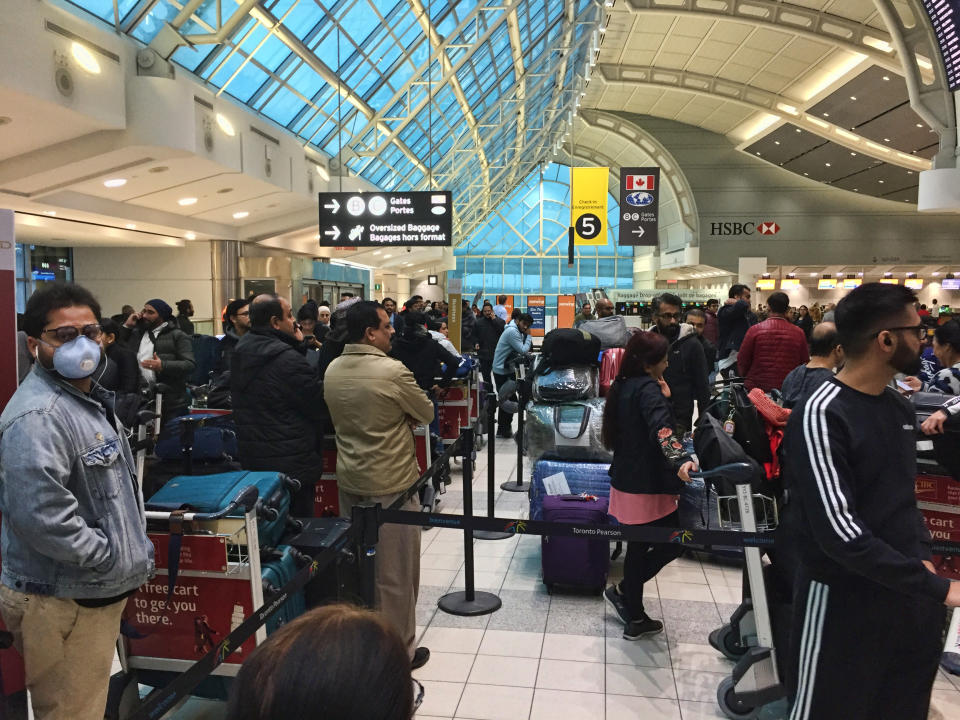Canada restricts travel and requires airlines to ban symptomatic passengers

Canada is closing its borders to non-citizens and non-residents, restricting international arrivals to four airports and requiring airlines to bar passengers who present with symptoms of the coronavirus from boarding.
Prime Minister Justin Trudeau announced the wide-sweeping restrictions – which will go into effect on Wednesday – at a press conference on Monday afternoon.
There are several exceptions to the travel ban, including immediate family members of Canadian citizens, foreign diplomats, airline crews and U.S. citizens. The restrictions will not apply to commerce or trade.
International arrivals will be restricted to Canada’s four busiest airports; Toronto’s Pearson International Airport, Montreal’s Trudeau International Airport, Calgary International and Vancouver International Airport. Domestic flights and those coming from the United States, Mexico, the Caribbean, and Saint Pierre and Miquelon will not be affected.
The government also said that airlines will be required to bar any passengers showing symptoms of the coronavirus from boarding an aircraft into Canada.
“Air operators will be required to complete a basic health assessment of every traveller based on guidance of the Public Health Agency of Canada,” Trudeau said. “This means that anyone who has symptoms will not be able to come to Canada.”
The government will offer financial support for Canadians trying to return home to cover costs of returning to Canada. Trudeau urged Canadians who are currently abroad to return as soon as possible.
The announcement comes as airlines around the world slash capacity and lay off significant portions of its workforce in response to the coronavirus pandemic, which has cut deeply into global air travel demand.
Capacity cuts and layoffs coming
Air Canada said Monday it will cut capacity by 50 per cent in the second quarter of 2020 due to what it calls a “severe drop” in traffic. Routes serving the Pacific market will see capacity reduced by approximately 75 per cent for the month of April.
“COVID-19 presents the global airline industry with unprecedented challenges, compounded by uncertainty as to the extent of its effects,” Air Canada’s chief executive Calin Rovinescu said in a statement.
“However, we are confident that after a decade of transformation and record results, Air Canada today has the agility, the team and the route network to successfully navigate through this crisis.”
In addition to the capacity cuts, the airline said it will implement a cost reduction program to cover about 50 to 60 per cent of the revenue losses expected in the second quarter. “Workplace reductions” will be one of those cost-cutting measures.
Air Canada has also joined a list of global carriers calling on governments to provide assistance and support that will alleviate the “existential threat” posed by the coronavirus, known as COVID-19.
Three global airline alliances – Oneworld, Skyteam and Star Alliance, of which Air Canada is a member of – said in a statement Monday that governments should “evaluate all possible means to assist the airline industry during this unprecedented period.”
“The unprecedented circumstances triggered by the coronavirus outbreak pose an existential threat not only to the airline industry but more generally to global trade and commerce, and social connectivity,” Star Alliance chief executive Jeffrey Goh said in a statement.
“As airlines stretch their limits to manage the crisis, it is equally critical for governments and stakeholders to avoid further burdens and step up with measures, as some have, that will ensure the future of the travel industry.”
U.S. will backstop the airlines
So far, the Canadian government has not provided any supports to the airline industry. Finance Minister Bill Morneau is scheduled to unveil an economic response package to the coronavirus crisis this week.
United States President Donald Trump said Monday that the American administration will be “backing the airlines 100 per cent.”
“We’re going to be in a position to help the airlines very much,” he said. “We’ve told the airlines we’re going to help them. We’re going to be backstopping the airlines.”
Rovinescu pointed to the governments in U.S., as well as Germany, France, Italy and Norway, which have either approved or are considering offering assistance to the airline industries.
“We believe that the Canadian airline industry should also see similar assistance, whether through forbearance of taxes, landing fees and other charges that form part of the aviation burden in Canada or otherwise until the industry stabilizes,” Rovinescu said.
“Our industry associations have been and will continue to make these representations to governments.”
Download the Yahoo Finance app, available for Apple and Android and sign up for the Yahoo Finance Canada Weekly Brief.


